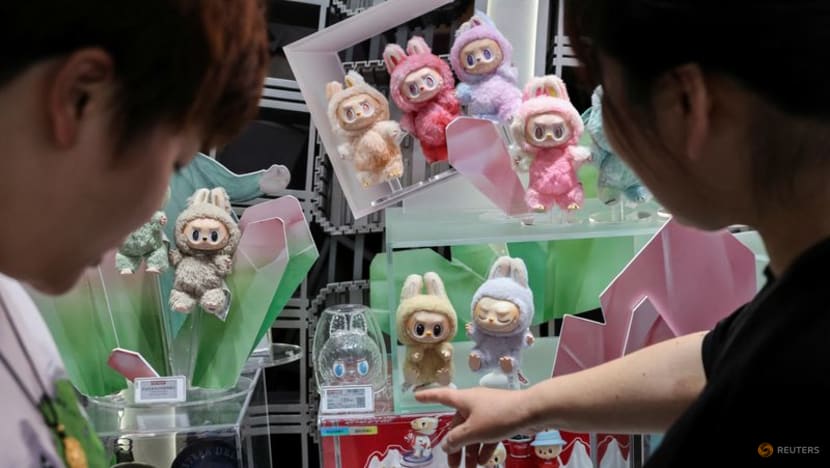China's Pop Mart, maker of the Labubu doll, says profit soars nearly 400% in first half
One of the major drivers has been its popularity with celebrity fans, who include Lisa of K-pop group Blackpink, singer Rihanna and ex-football star David Beckham.

People look at Labubu dolls at the flagship store of Pop Mart in Shanghai, China, Jun 13, 2025. (File photo: REUTERS/Go Nakamura)
SHANGHAI: China's Pop Mart, which has taken the world by storm with its ugly-cute Labubu doll, reported a nearly 400 per cent first-half net profit on Tuesday (Aug 19) on high demand for the toys and a shift towards higher-margin overseas markets.
Net profit of 396.5 per cent and a 204.4 per cent jump in revenues exceeded numbers flagged in an earnings preview last month, forecasting revenue growth of 200 per cent in the first half of 2025 and a recurring net profit increase of at least 350 per cent on the year.
Shares in Pop Mart have risen more than 200 per cent year-to-date, making the Chinese toy company more valuable than traditional industry giants like Barbie-maker Mattel and Hello Kitty parent company Sanrio.
Pop Mart often sells its collectable figurines in so-called "blind boxes" with buyers not knowing the exact design they will receive until they open the packaging.
One of the major drivers of the toothy-grinned Labubu's success has been its popularity with celebrity fans, who include Lisa of K-pop group Blackpink, singer Rihanna and ex-football star David Beckham.
Pop Mart is pledging to increase the supply of the dolls, which have sold out in stores around the world.
Its CEO, Wang Ning, in an interview with Chinese state media last month, said sales of Labubu will surpass 10 million units per day from September this year.
Pop Mart classifies Labubu under its The Monsters intellectual property (IP) characters. It said on Tuesday that The Monsters raked in 4.81 billion yuan (US$669.88 million) in the first half, accounting for 34.7 per cent of total revenue.
Four other IPs earned over 1 billion yuan during the period, including Molly and Crybaby, it added.
The company now has 571 stores - 40 of which it opened in the first half of this year - as well as 2,597 automated robot shops across 18 countries and regions, it added.








.png?itok=moSTdwSq)






